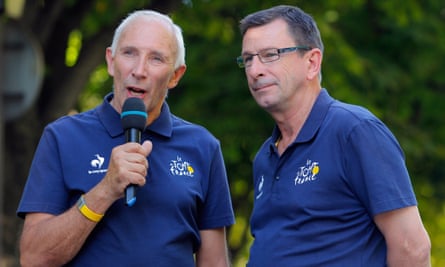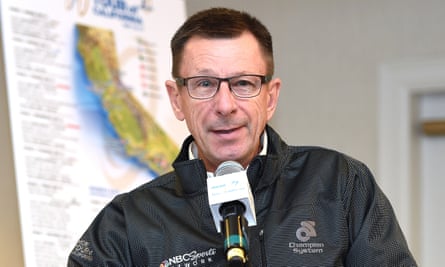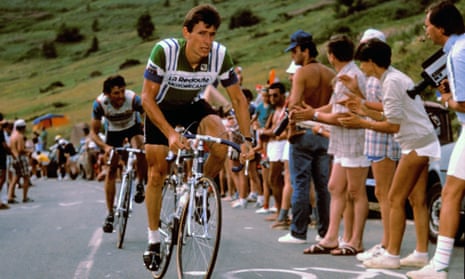Paul Sherwen, who has died of a heart attack aged 62, was a pioneering member of the group of English-speaking cyclists nicknamed the Foreign Legion, a doughty five-times Tour de France finisher and, together with Phil Liggett, half of the Channel 4 commentary pairing that brought the race into British sitting rooms daily for the first time during the late 1980s.
“Phil and Paul” became the voices of the Tour de France across the English-speaking world: the voluble Liggett described the action and the more measured Sherwen detailed moves and personalities. For a generation of fans – initially in the UK, later across most of the English-speaking world – they were the defining voices of the sport. By this year, Sherwen had attended 40 tours.
The pair made an arcane European sport accessible to viewers who might only vaguely have heard of the tour, who appreciated French scenery but were strangers to the niceties of bike racing. The goal, Liggett said, was to keep viewers from putting on the kettle until the commercial breaks came. It was a partnership that endured for 33 years, inspiring at least one fanzine – which took its title from the phrase which introduced most Sherwen insights, “Well Phil” – and took them to a wealth of English-speaking broadcasters worldwide. Latterly they worked solely for NBC.

The son of Margaret (nee McGowan) and John Sherwen, Paul was born in Widnes, Cheshire, but grew up in Kenya, where his father managed a factory producing fertiliser, paint and insecticides. The family returned to Britain when he was 14, after which his parents divorced. He was educated at boarding school in Kenya, and later said his disrupted childhood made him a highly adaptable person, which served him well through a globe-trotting life as a professional cyclist and broadcaster. It also left him fluent in Swahili, probably a first for any professional cyclist in the 70s.
He had been a successful swimmer – finishing second in the Kenyan championship as an under-14 – but he turned to cycling at the age of 16, initially for the Weaver Valley Cycling Club in Northwich, Cheshire; he soon came under the aegis of the coach Harold “H” Nelson, who trained other future professionals such as Graham Jones and John Herety.
In 1977, after Sherwen graduated from Manchester University with a degree in paper technology, he was invited to become part of the Athlétique Club de Boulogne-Billancourt, France’s leading amateur cycling team; the manager had seen him win one of England’s premier races, the Grand Prix Pernod. That year, he was crowned the best amateur racer in France and 12 months later he was in the Tour de France, riding for the Fiat professional team.
He was invited to nominate a successor at ACBB, and thus became the first of a string of English-speaking cyclists to find a route to the Tour de France through the club between 1978 and 1986. Other Foreign Legion graduates included the Tour de France winner Stephen Roche, of Ireland, King of the Mountains Robert Millar and stage winners Sean Yates and Phil Anderson, from Australia.
Sherwen rapidly realised that his chances to win for himself would be limited, and he became a noted “domestique”, one of the team riders who look after their leaders’ every need. At the La Redoute team in 1984 and 1985, his job was to shadow Roche, as the Irishman was similar in size; he would lend him his bike if he had a mechanical issue. In 1985, when Roche finished third in the tour, he would drop back time after time to the team support car to collect sponges soaked in eau de cologne which his leader would put on his neck in hot weather.
Sherwen was nicknamed “Climber” because although he struggled in the mountains, he had an unerring instinct for guiding a group to the finish inside the time cut on the toughest days. In his final tour, 1985, he crashed on stage 10, sustaining a massive bruise on his back, and finished the stage well outside the time limit. He was reinstated after his team manager and one of the organising team, Albert Bouvet, fought his cause with the referees. Bouvet told him: “You must get to Paris after what we have done for you”, and he lasted out the remaining 13 days.
Sherwen teamed up with Liggett in 1986, when Channel 4 became the first British broadcaster to offer daily race coverage. He continued to ride his bike each day to keep race fit. He won British national professional titles that year and in his final racing season, 1987.

Sherwen returned to Africa and settled in Kampala, Uganda, with his family in 1996, and bought the lease on the Busitema gold mine in the east of the country. The other shareholders included Liggett and Lance Armstrong. Sherwen met the latter when working as press officer at the Motorola team from 1991 to 1996, when one of his jobs was to introduce a callow, brash Armstrong to the media.
Latterly, Sherwen was involved in conservation work in Kenya. He also became chair of the country’s Chamber of Mines and worked closely with Bicycles for Humanity, a charity that delivers bikes to African countries and has set up a network of over 200 bike shops.
He is survived by his wife, Katherine, and their children, Margaux and Alexander.

Comments (…)
Sign in or create your Guardian account to join the discussion